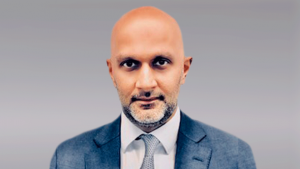
When we think about disruption, we generally tend to think about technology and the impact it has had on our industry, and its influence on our daily lives. But the reality is that is just the tip of the iceberg.
When we dig below the surface, and if you have read any news headlines recently (setting aside the fact that an algorithm may have fed you those), you may have noticed that disruption doesn’t stop there. We are witnessing a sea change in political, social, and environmental views. Even the dinner plate is not immune: What food should we eat, is the plant-based diet or the meat-based diet better? (I will save this topic for another time..)
This ‘Philosophical’ disruption has important ramifications for all of us, and it is a lead indicator that should inform us that everything we know is due for a re-think. Let’s try a little thought experiment: What would you say if I told you that the Earth was flat?
I know, it may sound crazy, but before you dismiss the idea entirely, let me take you on a quick flat earth tour:

 What are the inherent philosophical differences between a Round Earther vs a Flat Earther?
What are the inherent philosophical differences between a Round Earther vs a Flat Earther?
The world of modern psychology describes Flat Earthers as being subject to the Dunning Kruger effect, which states that non-experts overestimate their understanding based on simplistic facts, that lead them to extrapolate ideas that have little scientific basis. In the opposite corner, the Flat Earth camp allege that Round Earthers are subject to confirmation bias, where they pay more attention to people and ideas that they agree with or that they have been taught. The key argument is that that they do this without independent first-hand experience.
I am guessing that this far in, most people have already dismissed the Flat Earthers, but wait, not so fast! There are some essential truths hiding behind that gigantic ice wall:
- What do we know through our own experience? Have any of you ever been on the International Space Station to actually observe the curvature of the earth? Has anyone ever conducted any experiments to test the hypothesis?
- Do we ‘know’ that the earth is round, or do we simply ‘believe’ that the earth is round, because we were taught that?
- Who are we programmed to trust? Do the ideas of Neil DeGrasse Tyson, the archetypal scientist, hold more weight than self-proclaimed flat earth activist Mark Sargent? If so, what drives that?

So is the earth flat or round? (Drum roll). Okay, breathe, it is (probably) round, but what emerges from this debate is: Whether we like it or not, a lot of what we know is not from our direct experience, rather we learn it from someone else, and that is continually reinforced throughout our lives. Our biases can also play a big part in deciding whom we trust, and therefore what information we are willing to absorb or discard.
What on this Flat Earth has any of this got to do with trading?
Could it be time for us to embrace some of these ideas, and challenge the current order of things? Can we step outside (mind the dome) and re-examine the way we think about our own little world of trading and execution?
It IS what it IS or IS it?
As in life, in trading, everything is fair game for a rethink — including the most tightly held notions of what provides for the best implementation shortfall returns. Robert Almgren, one of the pioneers in the research into optimal execution strategies (Almgren-Chriss), had his own flat-earth moment, when he was quoted in an article “Why Robert Almgren no longer trades using Almgren Chriss” (Risk.net Magazine July 2017) – because he now believes that the model he co-authored, requires a radical rethink that challenges some of the fundamental assertions that formed the basis of his initial theory. If Almgren can take a view that challenges the current order (that he created!), it means that we as an industry should be open to questioning our own historical approaches, either to verify or challenge the way things have been done.
Spinning wheels
In my previous article ‘Letting go of the wheel’, I touched upon some of the more macro philosophical issues that we have seen play out after the introduction of The Wheel. If the goal is to continually improve execution quality and ultimately investor returns:
How might the buy-side and sell-side work together to integrate the PM investment process to inform our algo trading decisions, to capitalize on the valuable information that precipitates trading activity?
How can the sell-side use new research and technologies to optimize trade planning and execution: Can we look at IS in a new light, by taking a leaf out of the new research from Almgren and others?
How might the buy-side balance the dilemma of encouraging competition for best execution on the Wheel, while still ensuring that the results do not end up self-fulfilling and tying them to their methodology(s), given that our ideas of what is ‘best’ will also likely change?
In light of the current wave of disruption we are experiencing, this is the perfect time for us to challenge and rethink our assumptions. Not just in pursuit of change alone, but to be honest and ready to re-pivot our ideas as we craft new ways to move forward as an industry. Can all the buy-side and sell-side Flat Earthers please step forward!

















In troubled times – expanding our coverage
There is no doubt that we are living through unprecedented times and unfortunately all the digital tools in the world cannot truly protect us. The hope is that the measures in force will lessen the impact of COVID-19 and that all of you remain healthy and fit.
Best Execution is a meeting place between the buy and sellside and we cover the latest capital markets, market infrastructure, regulation, research and technology across the asset classes — equities, fixed income and FX. The coronavirus is certainly making its presence known and we will be expanding our coverage to looking at the impact on the financial ecosystem, its participants, structures and frameworks.
Unfortunately, many events and conferences have been cancelled but we also hope to provide insights and interviews with leading market figures who were going to debate and discuss the latest trends at these events.
Although the news has been unremittingly depressing and unnerving, I hope we can take some hope by recent developments in China. The government has closed down its last coronavirus hospital because there are not enough new cases to support them and Apple has just reopened its stores across the country. Of critical importance will be the development of an effective vaccine, and the sooner the better. There are reports that scientists in Israel are on the brink of announcing the development of a coronavirus vaccine – we can only hope.
If you have any suggestions for coverage, news tips or just want to share some thoughts please feel free to drop me a line at lynn@bestexecution.net
Thanks for your time.
Lynn
©BestExecution 2020
[divider_to_top]